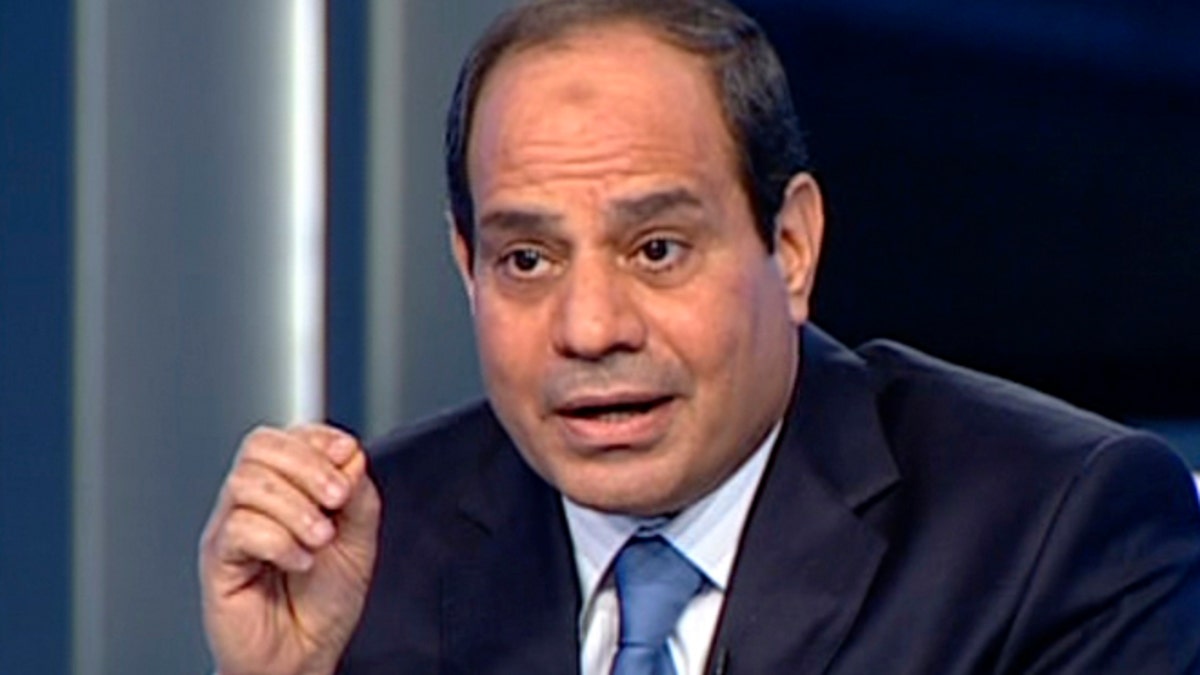
May 5, 2014: In this image made from video broadcast on Egypt's State Television, Egypt's retired Field Marshal Abdel-Fattah el-Sissi listens to a question during an interview in a nationally televised program in Cairo, Egypt. (AP/Egypt's State Television)
CAIRO – An Egyptian court on Tuesday banned leaders of the country's former ruling party under ousted President Hosni Mubarak from running in any elections, a vague ruling that could bar former officials of that regime from returning to politics for the time being.
The ban comes as Egypt prepares for presidential elections later this month. Former military chief Abdel-Fattah el-Sissi, who removed Mubarak's successor, the Islamist Mohammed Morsi -- is poised to win the vote.
The Cairo Court for Urgent Matters ruled that leaders of Mubarak's National Democratic Party cannot run in any presidential, parliamentary or local city council elections. The ruling is binding until a higher tribunal issues a final verdict on the matter, and it is highly likely that a higher court will overturn it because it violates a principle of equal political rights granted by the constitution.
It did not however define what constituted being a party leader, making it hard for the coming election committee to implement it. A previous court case attempting to ban NDP members from politics for a period was shot down by the constitutional court.
While the NDP was disbanded and its offices shut down in 2011, months after an uprising toppled the autocratic Mubarak, its members could still run in elections. Some formed new parties, struck alliances with existing parties or ran as independents in the last parliamentary elections, in 2011.
No date has been set yet for parliamentary elections. However, experts fear that in the absence of strong liberal-leaning parties and the boycott of Islamists, there is room in the coming parliament for former members of Mubarak's regime to secure seats.
The court ruling comes a day after el-Sissi gave the first TV interview of his campaign, saying that under his rule, Morsi's Muslim Brotherhood will make no comeback.
El-Sissi's comments gave a stark signal of his intention to eliminate the 86-year-old Brotherhood as both a political and ideological force in the country. The group faces an unprecedented popular resentment, following its meteoric rise and fall from power over the past three years.
Asked whether the Brotherhood will no longer exist under his presidency, el-Sissi replied, "Yes. Just like that."
"It's not me that finished it, the Egyptians have. The problem is not with me," he said.
The Brotherhood and its Islamist allies won every election following Mubarak's ouster, dominating the parliament and capturing the presidency under Morsi. The Brotherhood's electoral strength was largely rooted in a widespread grassroots organization it had built up for decades despite being banned under Mubarak.
But after a year in office, millions joined protests demanding Morsi's removal, accusing his Brotherhood of monopolizing power and seeking to change the country's identity along the lines of Brotherhood ideology. El-Sissi overthrew Morsi on the fourth day of those protests.
